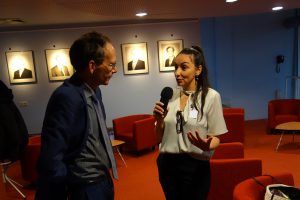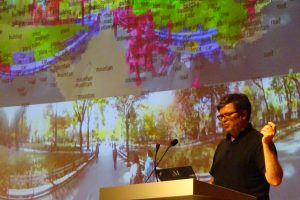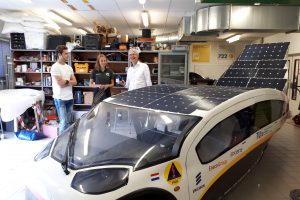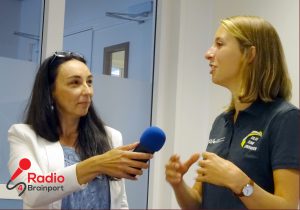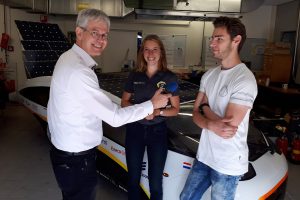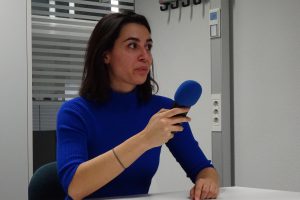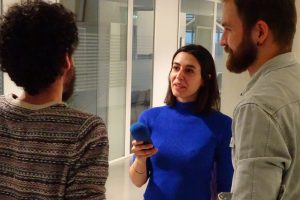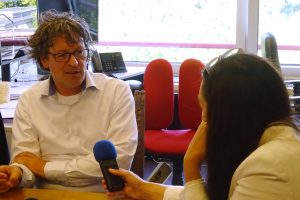
In an interview for Radio4Brainport.org, newly appointed full professor at the Eindhoven University of Technology (TU/e), Rudi Bekkers, reveals that he found evidence that Chinese authorities systematically favour Chinese patent applications over foreign applicants. Such discrimination makes it more difficult for European companies to get intellectual property rights granted in China, arguably leading to unfair competition. It appears not just an incidental case of the decline a few European patent applications, but now there is scientific evidence of a systematic discrimination.
Podcast : https://www.patreon.com/posts/21486928
Professor Rudi Bekkers gave his inaugural lecture at TU/e on 14 September 2018, giving insight from his years of research and policy advisory work on standardisation and patents in technology.
In this podcast, Erika van der Merwe asks Prof Bekkers about the practical implications of standardisation in technology for European business, and about the stance taken by China.
Standardisation in technology and the nurturing of the patent system, Bekkers explains, is essential for creating a context in which innovators can specialise and flourish, and where technological advancement is possible.
“Standardisation is helpful in many ways. Companies – for instance in the fields of communication, mobility, smart grids or the internet of things – understand that if they build standalone technologies, that do not allow for interoperability, it is a dead end. So, you don’t have to impose standards; everyone wants to be at the table.”
Policymakers have a key role in ensuring that standards are fairly developed, through an open process, which is transparent, Bekkers says.
Public interest in standardisation
“Always thinking from the perspective of the general public interest, policymakers are there to make sure that the pro-competitive forces are greater than the anti-competitive forces when companies get together in the process of standardisation. Further, not all stakeholders who have an interest in the process are necessarily sitting at the table. Some stakeholders have all the resources, or can be influential in the process, while others are absent, or perhaps have less effective influence. Policymakers are there to keep an eye on that.”
Bekkers gave the example in his inaugural address of a typical laptop today, which uses about 250,000 patents. Negotiating patent rights with all stakeholders can become a nightmare for innovators and manufacturers, and also here a regulatory framework is essential. He sees it as an accomplishment of the Brainport region, and Philips by implication, to have initiated the concept of patent pools, and to have convinced national authorities that it this is in the interest of the end consumer and is not an example anti-competitive behaviour.
The unprecedented degree of lobbying that took place in recent years, in the run-up to the issuing of a communication by the European Commission (EC) on technological standardisation, shows just how high the stakes are for technology owners in shaping the conversation around standardisation. Despite divergent perspectives and views within the EC, including on aspects of competition and on growth of industry, it nevertheless succeeded in issuing of a formal communication by the end of last year.
“The communication answers quite a few questions, though not all questions. But it definitely brings us a step forward, for example in achieving transparency, particularly for small start-ups. We hope to see how this transparency will be improved in coming years.”
A global approach to standardisation
That there is progress in formulating coherent views on standards in technology is significant given that the approach has become global. “It is almost always a global process now. The times where important technologies were different between regions lie behind us.”
Interestingly, Bekkers sees that even China, which in the past drove an inwardly focused policy of so-called indigenous innovation, has shifted gears. “China tried incredibly hard for many years to create their own standards. It was a total failure. The outcome is that those companies that resisted these Chinese-only standards are the biggest players in the world today, and China has turned around and has now focused itself on the outside world.”
Nevertheless, he observes some remaining Chinese resistance to levelling the playing fields in global technological developments. In a recent academic study, he finds clear evidence of discrimination in the Chinese patent office between domestic and foreign patent applicants. “This is worrisome, given that it is a fundamental principle of patent law that there is no distinction between local and foreign applicants.”
As this finding may have a major consequence for the international relations with China, a draft scientific paper is currently subject to a heavy review process. Yet Bekkers appears confident about the rigorous and solid approach behind the investigations of his team.
Universities to shape thinking about the role of technology
Bekkers sees an important role for academic institutions such as the TU/e in shaping future thinking around the role of technology.
“The market is expecting people with excellent technical knowledge, but also people who can reflect on what they do, and who can function across disciplines.” He was instrumental in redesigning and broadening the curriculum at the university, with a view to equipping students for the realities of a career in technology.
“Making a product that is technologically superior is not a guarantee that that product will be a success. So many factors will affect product success; patents and standards are two important phenomena there.”
Equipping students with the tools to think about technology in a way that has a positive impact, is an underpinning theme in the development of a long-term vision by the TU/e.
“We face a number of grand societal challenges in Europe and elsewhere in the world – in sustainability, in mobility, in demographics and in health – and there is a big belief that engineers can contribute to solutions to these challenges. In the end, what we should be contributing to at the university, is to have a positive impact.”
